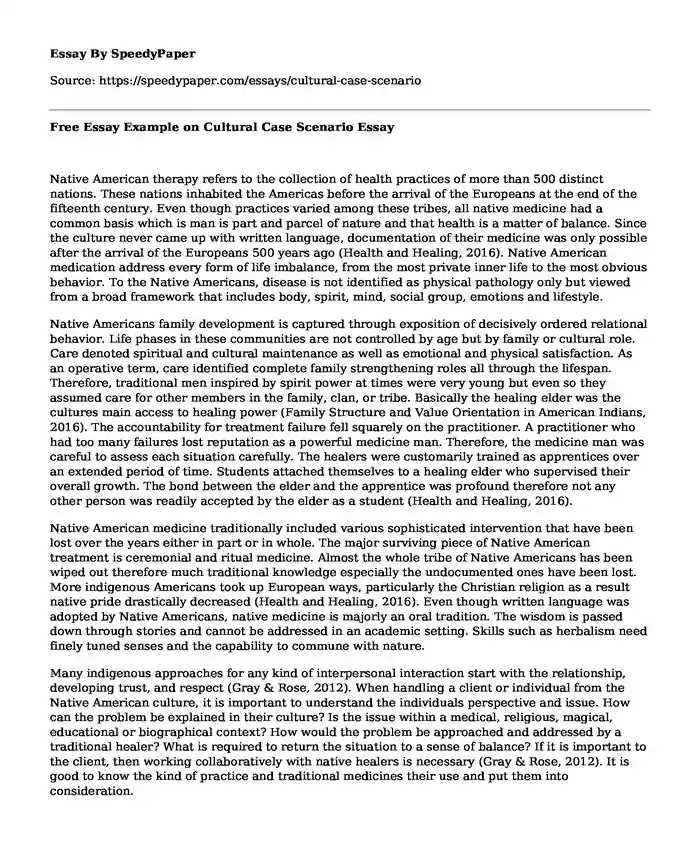Native American therapy refers to the collection of health practices of more than 500 distinct nations. These nations inhabited the Americas before the arrival of the Europeans at the end of the fifteenth century. Even though practices varied among these tribes, all native medicine had a common basis which is man is part and parcel of nature and that health is a matter of balance. Since the culture never came up with written language, documentation of their medicine was only possible after the arrival of the Europeans 500 years ago (Health and Healing, 2016). Native American medication address every form of life imbalance, from the most private inner life to the most obvious behavior. To the Native Americans, disease is not identified as physical pathology only but viewed from a broad framework that includes body, spirit, mind, social group, emotions and lifestyle.
Native Americans family development is captured through exposition of decisively ordered relational behavior. Life phases in these communities are not controlled by age but by family or cultural role. Care denoted spiritual and cultural maintenance as well as emotional and physical satisfaction. As an operative term, care identified complete family strengthening roles all through the lifespan. Therefore, traditional men inspired by spirit power at times were very young but even so they assumed care for other members in the family, clan, or tribe. Basically the healing elder was the cultures main access to healing power (Family Structure and Value Orientation in American Indians, 2016). The accountability for treatment failure fell squarely on the practitioner. A practitioner who had too many failures lost reputation as a powerful medicine man. Therefore, the medicine man was careful to assess each situation carefully. The healers were customarily trained as apprentices over an extended period of time. Students attached themselves to a healing elder who supervised their overall growth. The bond between the elder and the apprentice was profound therefore not any other person was readily accepted by the elder as a student (Health and Healing, 2016).
Native American medicine traditionally included various sophisticated intervention that have been lost over the years either in part or in whole. The major surviving piece of Native American treatment is ceremonial and ritual medicine. Almost the whole tribe of Native Americans has been wiped out therefore much traditional knowledge especially the undocumented ones have been lost. More indigenous Americans took up European ways, particularly the Christian religion as a result native pride drastically decreased (Health and Healing, 2016). Even though written language was adopted by Native Americans, native medicine is majorly an oral tradition. The wisdom is passed down through stories and cannot be addressed in an academic setting. Skills such as herbalism need finely tuned senses and the capability to commune with nature.
Many indigenous approaches for any kind of interpersonal interaction start with the relationship, developing trust, and respect (Gray & Rose, 2012). When handling a client or individual from the Native American culture, it is important to understand the individuals perspective and issue. How can the problem be explained in their culture? Is the issue within a medical, religious, magical, educational or biographical context? How would the problem be approached and addressed by a traditional healer? What is required to return the situation to a sense of balance? If it is important to the client, then working collaboratively with native healers is necessary (Gray & Rose, 2012). It is good to know the kind of practice and traditional medicines their use and put them into consideration.
References
Family Structure and Value Orientation in American Indians. (2016, April 5). Retrieved from Washington State Department of Social and Health Services: https://www.dshs.wa.gov/ca/about-childrens-administration
Gray, J. S., & Rose, W. J. (2012). Cultural Adaptation for Therapy with American Indians and Alaska Natives. Multicultural Counseling and Development, 82-91.
Health and Healing. (2016, April 5). Traditional Healing. Retrieved from Health and Healing: http://www.healthandhealingny.org/tradition_healing/native.html
Cite this page
Free Essay Example on Cultural Case Scenario. (2019, Aug 15). Retrieved from https://speedypaper.net/essays/cultural-case-scenario
Request Removal
If you are the original author of this essay and no longer wish to have it published on the SpeedyPaper website, please click below to request its removal:
- Business Model Essay Sample
- Amusing The Million by John F. Kasson: Free Sample to Check
- Essay Sample about Organizational Diversity in Art Museum Curation
- Healthcare Essay Sample: Saving Mothers in Sri Lanka
- Free Research Paper Sample on Human Marine Activities
- Essay Sample about Pluto, A Dwarf Planet
- A Critical Analysis of The War Prayer by Mark Twain, Essay Example
Popular categories





